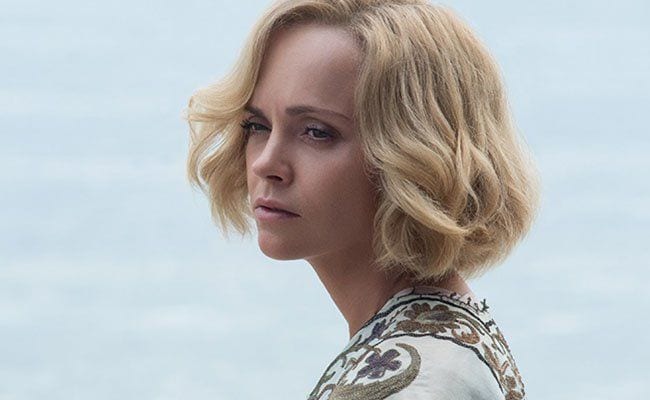
I must have been about 15 when I first heard of Zelda Sayer Fitzgerald. It was summer, and I had found a paperback copy of Ernest Hemmingway’s A Moveable Feast on the bookshelf where my parents kept the books they’d read in college. Sitting in our sunny backyard, I met the version of Zelda that Hemmingway made famous: F. Scott Fitzgerald’s controlling, unhinged wife. Later, when I met Zelda again in Woody Allen’s Midnight in Paris (2011), she was droll, witty, and wild.
Zelda is often represented as the quintessential flapper, a vivid, yet two-dimensional icon of the lost generation literati. So when I learned about Amazon’s Z: The Beginning of Everything, a series focused on Zelda’s courtship and early marriage with Scott, I was ready for the glamorous portrait of 1920s New York advertised by the series’ trailer and stills showing Zelda (Christina Ricci) and Scott (David Hoflin) draped in silk bathrobes and toasting with champagne. Instead, I discovered something harder to watch, and certainly more important: an uneven but unconventional portrait of Zelda from writers and producers who are on her side.
The first few episodes of Z take place in Zelda’s hometown of Montgomery, Alabama, where she defies her father by smoking, drinking, and sneaking out to attend dances with the Yankee soldiers who will soon ship out to aid Britain in the final weeks of WWI. When Zelda and Scott meet at a country club dance, he rather arrogantly announces his intentions to be a famous writer; she ignores his phone calls, then takes them; they fall in love and rendezvous in a graveyard; her father, predictably, disapproves.
This romantic mood fades almost as soon as Scott proposes, as that’s when Z begins to reveal the painful power dynamic that results from Scott’s desire to make Zelda his muse. Zelda initially refuses to marry Scott, then equivocates, telling him she will marry him when and if his novel is published. He tells her that without her, he is worthless as a writer (and indeed, when viewers learn that Scott’s novels ‘borrowed’ heavily from Zelda’s journals, he may have been right). After This Side of Paradise is published, Scott is only more convinced that he never would have been published without Zelda’s ultimatum.
Scott’s fervent belief that Zelda is the source of his literary genius both empowers and entraps Zelda: Zelda knows that she is free to leave Scott, but if she does, she will destroy him. Christina Ricci plays Zelda as a woman walking willingly and half-knowingly into disaster. In a pivotal scene where Zelda tells her parents that she loves Scott (David Hoflin) and will marry him, Ricci’s tone is pleading, almost mournful, as though Zelda knows that she loves Scott against her better judgment.
Even so, it is only after they begin their life in New York together that Zelda fully realizes just how tiresome the role of muse can be. When the aloof and alluring Edna St. Vincent Millay (Lucy Walters) asks Scott, “What does your wife do, exactly?” Scott replies, “She’s Zelda. She loves me.” Zelda discovers too late that there’s no room in their marriage for two writers. Zelda serves merely to flatter Scott and to soothe him, to wear the stylish New York clothes he likes, to ignore or justify his alcoholism and his attacks on the writers and academics his sees as his enemies.
In a letter to Scott during their long engagement, Zelda writes, “All I want to know is that my life is my own.” Zelda’s tragedy, the show suggests, is that her life never does quite belong to her. She goes from a home ruled by the family patriarch to a marriage with a controlling husband. Still, she does everything she can to make other people believe that she is in control of her life and that she has the life that she wants.
When Scott’s drinking buddies from Princeton take over their wedding reception and an utterly wasted Scott spends the night conversing with another woman, Zelda’s sisters are outraged on her behalf. As she tries to persuade them to stay, Zelda tells them, “It’s so modern! This is what I want.” But later, on the phone with her mother, she lies about the day’s events, offering a description of the wedding she wishes she had.
Z is no anthem for the Roaring Twenties. The show’s pacing can feel awkward at times, and during the second half of the season, as Zelda and Scott’s relationship falls into unhealthy, potentially abusive patterns, I found it difficult to watch Ricci and Hoflin acting out what seemed to be the same fight over and over again. Yet in spite of Z’s flaws, I couldn’t look away from Ricci’s portrayal of Zelda as a woman trapped by her own desire to make others believe that her life is exactly what she wants it to be. That sounds like the Zelda I know.


![Call for Papers: All Things Reconsidered [MUSIC] May-August 2024](https://www.popmatters.com/wp-content/uploads/2024/04/all-things-reconsidered-call-music-may-2024-720x380.jpg)



